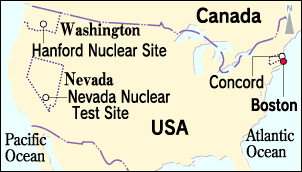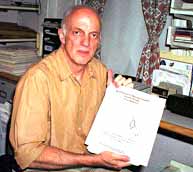  Richard Clapp says, "We can't dismiss
the possibility that DU and other low-dose
radioactive materials are impairing human
health." (Boston, Massachusetts) Richard Clapp says, "We can't dismiss
the possibility that DU and other low-dose
radioactive materials are impairing human
health." (Boston, Massachusetts) |
| State's highest cancer rates Study of doses needed |
On Tuesday afternoon, I drove from Concord to the home of Dr. Richard Clapp (54) on the south side of Boston, the capital of Massachusetts. As an epidemiologist, Clapp specializes in the relationship between radiation exposure and cancer. He also teaches environmental health as associate professor at Boston University's School of Public Health.
"The residents of Concord definitely have generally higher rates of cancer than other areas in Massachusetts." Clapp took relevant materials off shelves in his study as he talked. "I released my study data just as resident concern about Starmet Corporation (the former Nuclear Metals Inc.) was growing."
![]() Twice the state's leukemia rates
Twice the state's leukemia rates
Clapp was the first director of the state Cancer Registry established in 1980. He worked there until 1989. Between 1982 and 1986, the registry studied leukemia and multiple myeloma in Concord males. In 1991 it reported that "incidence in Concord was almost double that of other areas in the state."
"Though it was only ten persons, the difference was clearly statistically significant. And we already knew from surveys of Hiroshima and Nagasaki survivors that leukemia and multiple myeloma are highly correlated with radiation."
Clapp also cited the cases of American soldiers exposed starting in the mid-1940s when they participated in atmospheric nuclear tests conducted over the Pacific Ocean and at the nuclear test site in Nevada. He also mentioned workers at the contaminated Hanford Nuclear Weapons Plant (Washington). He said the incidence of leukemia and multiple myeloma was elevated for these populations as well.
Clapp has a breakdown of the cancer rates in Concord that local former electrical engineer William Smith (71) created based on cancer records from 1982 to 1990. According to this report, released in 1995, Concord's rates are higher than state averages for the following diseases: thyroid cancer (2.5 times), testicular cancer (2.2), myeloma (1.9), melanoma (1.8), brain tumor (1.5) and breast cancer (1.3).
A Concord resident who studied cancer incidence in roughly 100 neighborhood households over two years (1995 -1996) found 54 cases of cancer. I showed Clapp the materials that the resident had put together. His large eyes widened as he perused the three sheets of paper.
"This is amazing material. I had no idea someone was doing this kind of survey." This was the first he had heard of the four persons in their 20s and 30s living on the same street who contracted cancer over a relatively short period. Three of the four contracted lung cancer.
![]() A veterans survey
A veterans survey
Clapp and the staff of Boston University's School of Public Health (Department of Environmental Health) are now studying the relationship between diseases of Gulf War veterans living in Massachusetts and DU penetrators and other factors. Lung cancer risk is known to rise when DU particles enter the body and lodge in the lungs. This raised Clapp's suspicions about the high cancer rates among young Concord residents.
"But we can't conclude that Starmet is the villain merely from this study and from what I was able to learn," added Clapp. "For example, were the persons who contracted leukemia or multiple myeloma Starmet workers or neighborhood residents? What was their dose? We have to go into it more deeply."
![]() Encouragement to the residents
Encouragement to the residents
A specialist may require 100 percent proof to draw a conclusion. However, Clapp also said, "It's natural for people living where radiation exposure is a possibility-near nuclear weapons-related plants or research centers, nuclear fuel or nuclear waste facilities, weapons testing facilities or disposal facilities, nuclear power plants-to be concerned. We medical professionals have to respond to those people's fears."
This was support from an independent expert. Researchers like Clapp offer more encouragement to Concord residents and Gulf War veterans than anything else.